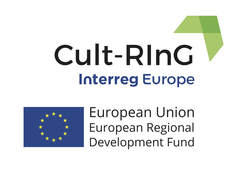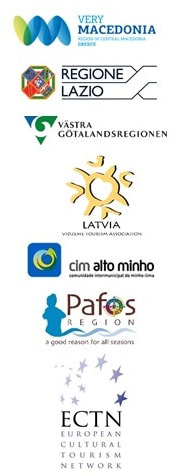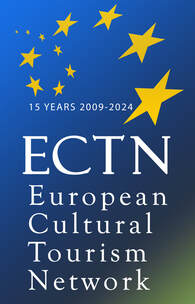|
Cult-RInG project is an inter-regional cooperation project for improving natural and cultural heritage policies in the Interreg Europe Programme, which helps regional and local governments across Europe to develop and deliver better policy by integrated and sustainable impact for people and place. The project is co-funded by the European Regional Development Fund and made possible by the Interreg Europe programme. Cult-RInG budget: 1,35 M EUR, ERDF co-funding: 1,13 M EUR. Cultural Routes of the Council of Europe have been established for the past 29 years, stressing the importance of European identities. The Council of Europe Enlarged Partial Agreement (EPA) on Cultural Routes currently comprises 32 routes contributing to protection and development of natural and cultural heritage.
Cultural Routes (CRs) are used as powerful tools to promote and preserve EU’s shared and diverse cultural identities. CRs provide a better understanding of the history of Europe through interregional exchanges of people, ideas and cultures. The impacts of CRs on SMEs’ innovation and competitiveness have showed that CRs are at the heart of cultural tourism development; they have achieved a noteworthy impact and progress, and shown remarkable potential for SME generation, networking, social cohesion, intercultural dialogue, and for promoting the image of Europe. CRs represent a source of innovation, creativity, small business creation, and cultural tourism products and services development. There is a common challenge, in terms of assessing and exploiting the benefits of existing CRs and deploy them in the development of new CRs, so that Growth & Jobs targets can be met faster. Expected results
The expected results are the inclusion of CR impacts and benefits in the partners' action plans and policy instruments.
3 specific themes of the project related to Cultural Routes:
Main activities
Cultural Routes as Investment for Growth and Jobs: EU Project is launched 19 January 2017 A new interregional cooperation project has been launched, starting in January 2017, on ‘Cultural Routes as Investment for Growth and Jobs’ (Cult-RInG), co-funded by the EU European Regional Development Fund (ERDF) in the Interreg Europe programme.
The Cult-RInG project is led by the Region of Central Macedonia in Greece with five other destination authority partners: Lazio Region in Italy, Region Västra Götaland in Sweden, Podkarpackie Regional Tourism Board in Poland, Intermunicipal Community of Alto Minho in Portugal and Pafos Regional Board of Tourism in Cyprus. The European Cultural Tourism Network (ECTN) based in Brussels is an Advisory partner in charge of project communication matters. Cult-RInG is the only project in the Interreg Europe programme that focuses on Cultural Routes of the Council of Europe. Cultural Routes (CRs) of the Council of Europe (CoE) have been established for the past 30 years, stressing the importance of European identities. The CoE’s Enlarged Partial Agreement (EPA) on CRs currently comprises 33 routes contributing to protection and development of natural and cultural heritage. CRs are used as powerful tools to promote and preserve EU’s shared and diverse cultural identities. CRs provide a better understanding of the history of Europe through interregional exchanges of people, ideas and cultures. The impacts of CRs on SMEs’ innovation and competitiveness have showed that CRs are at the heart of cultural tourism development; they have achieved a noteworthy impact and progress, and shown remarkable potential for SME generation, networking, social cohesion, intercultural dialogue, and for promoting the image of Europe. CRs represent a source of innovation, creativity, small business creation, and cultural tourism products and services development. There is a common challenge, in terms of evaluating and exploiting the benefits of existing CRs and deploy them in the development of new CRs, so that Growth & Jobs targets can be met faster. The overall objective of the Cult-RInG project is to highlight the value of investments in European Cultural Routes, in terms of their contribution to Growth & Jobs, with capitalisation of good practices, policy learning, policy implementation, development of new Cultural Routes, monitoring and capacity building. Main outputs are action plans on CR development and upgrading, with implementation and monitoring of improved policy instruments in six regions, communication and dissemination tools for policy learning and capacity building, contribution to EU policies and EU2020 targets. The beneficiaries are regional authorities looking for capturing the benefits of CRs, both existing ones with greater visibility and new ones, NGOs, European Networks, EU institutions, international organisations and stakeholders. The project sub-objectives are:
The first phase of the project (2017-2018) will focus on exchange of experience and policy formulation resulting in action plans for implementation during the second phase (2019-2020). The policy learning process will be organised with a focus on three specific themes related to CR impacts and development, viz:
The project approach includes Interregional Workshops, leading to the production of 'Policy Guidelines', staff exchanges in order to provide hands on experience and thus strengthen the policy lessons, study tour where key issues and good practices can be demonstrated on the ground for the benefit of policy makers, stakeholder engagement, action plans preparation and implementation monitoring including new cultural routes development and enhanced visibility of existing routes, with links to SMEs, host communities, sustainable cultural tourism development, and mainstreaming of the results into Operational Programmes and European Structural and Investment Funds. All project events this year will be shared in the frame of the UN ‘International Year of Sustainable Tourism for Development 2017’ and all project events next year will be included in the activities for the ‘European Year of Cultural Heritage 2018’, in close cooperation with the European Institute of Cultural Routes, the Council of Europe and EU institutions. The Cult-RInG project will conclude with an international conference, as a high level event, in the Spring of 2020. Cult-RInG project is made possible by the financial support from the European Union – the Interreg Europe programme and European Regional Development Fund (ERDF). |



